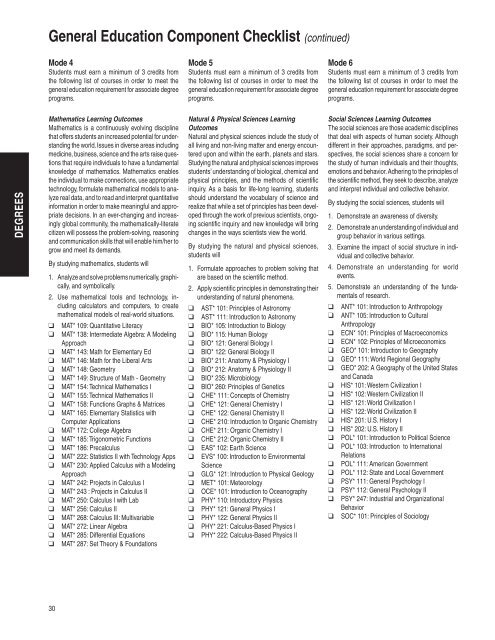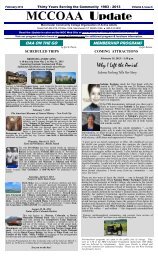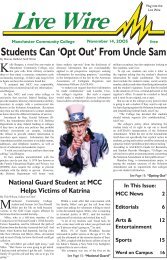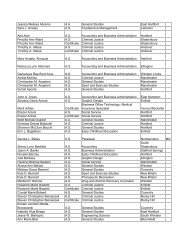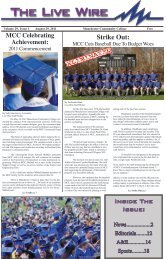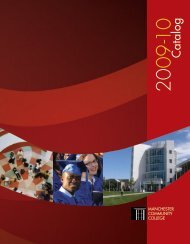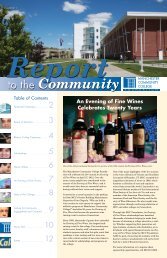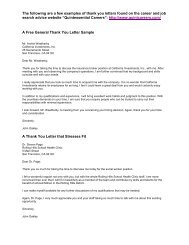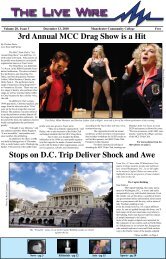Liberal Arts and Science - Manchester Community College ...
Liberal Arts and Science - Manchester Community College ...
Liberal Arts and Science - Manchester Community College ...
You also want an ePaper? Increase the reach of your titles
YUMPU automatically turns print PDFs into web optimized ePapers that Google loves.
DEGREES<br />
General Education Component Checklist (continued)<br />
Mode 4<br />
Students must earn a minimum of 3 credits from<br />
the following list of courses in order to meet the<br />
general education requirement for associate degree<br />
programs.<br />
Mathematics Learning Outcomes<br />
Mathematics is a continuously evolving discipline<br />
that offers students an increased potential for underst<strong>and</strong>ing<br />
the world. Issues in diverse areas including<br />
medicine, business, science <strong>and</strong> the arts raise questions<br />
that require individuals to have a fundamental<br />
knowledge of mathematics. Mathematics enables<br />
the individual to make connections, use appropriate<br />
technology, formulate mathematical models to analyze<br />
real data, <strong>and</strong> to read <strong>and</strong> interpret quantitative<br />
information in order to make meaningful <strong>and</strong> appropriate<br />
decisions. In an ever-changing <strong>and</strong> increasingly<br />
global community, the mathematically-literate<br />
citizen will possess the problem-solving, reasoning<br />
<strong>and</strong> communication skills that will enable him/her to<br />
grow <strong>and</strong> meet its dem<strong>and</strong>s.<br />
By studying mathematics, students will<br />
1. Analyze <strong>and</strong> solve problems numerically, graphically,<br />
<strong>and</strong> symbolically.<br />
2. Use mathematical tools <strong>and</strong> technology, including<br />
calculators <strong>and</strong> computers, to create<br />
mathematical models of real-world situations.<br />
❑ MAT* 109: Quantitative Literacy<br />
❑ MAT* 138: Intermediate Algebra: A Modeling<br />
Approach<br />
❑ MAT* 143: Math for Elementary Ed<br />
❑ MAT* 146: Math for the <strong>Liberal</strong> <strong>Arts</strong><br />
❑ MAT* 148: Geometry<br />
❑ MAT* 149: Structure of Math - Geometry<br />
❑ MAT* 154: Technical Mathematics I<br />
❑ MAT* 155: Technical Mathematics II<br />
❑ MAT* 158: Functions Graphs & Matrices<br />
❑ MAT* 165: Elementary Statistics with<br />
Computer Applications<br />
❑ MAT* 172: <strong>College</strong> Algebra<br />
❑ MAT* 185: Trigonometric Functions<br />
❑ MAT* 186: Precalculus<br />
❑ MAT* 222: Statistics II with Technology Apps<br />
❑ MAT* 230: Applied Calculus with a Modeling<br />
Approach<br />
❑ MAT* 242: Projects in Calculus I<br />
❑ MAT* 243 : Projects in Calculus II<br />
❑ MAT* 250: Calculus I with Lab<br />
❑ MAT* 256: Calculus II<br />
❑ MAT* 268: Calculus III: Multivariable<br />
❑ MAT* 272: Linear Algebra<br />
❑ MAT* 285: Differential Equations<br />
❑ MAT* 287: Set Theory & Foundations<br />
30<br />
Mode 5<br />
Students must earn a minimum of 3 credits from<br />
the following list of courses in order to meet the<br />
general education requirement for associate degree<br />
programs.<br />
Natural & Physical <strong>Science</strong>s Learning<br />
Outcomes<br />
Natural <strong>and</strong> physical sciences include the study of<br />
all living <strong>and</strong> non-living matter <strong>and</strong> energy encountered<br />
upon <strong>and</strong> within the earth, planets <strong>and</strong> stars.<br />
Studying the natural <strong>and</strong> physical sciences improves<br />
students’ underst<strong>and</strong>ing of biological, chemical <strong>and</strong><br />
physical principles, <strong>and</strong> the methods of scientific<br />
inquiry. As a basis for life-long learning, students<br />
should underst<strong>and</strong> the vocabulary of science <strong>and</strong><br />
realize that while a set of principles has been developed<br />
through the work of previous scientists, ongoing<br />
scientific inquiry <strong>and</strong> new knowledge will bring<br />
changes in the ways scientists view the world.<br />
By studying the natural <strong>and</strong> physical sciences,<br />
students will<br />
1. Formulate approaches to problem solving that<br />
are based on the scientific method.<br />
2. Apply scientific principles in demonstrating their<br />
underst<strong>and</strong>ing of natural phenomena.<br />
❑ AST* 101: Principles of Astronomy<br />
❑ AST* 111: Introduction to Astronomy<br />
❑ BIO* 105: Introduction to Biology<br />
❑ BIO* 115: Human Biology<br />
❑ BIO* 121: General Biology I<br />
❑ BIO* 122: General Biology II<br />
❑ BIO* 211: Anatomy & Physiology I<br />
❑ BIO* 212: Anatomy & Physiology II<br />
❑ BIO* 235: Microbiology<br />
❑ BIO* 260: Principles of Genetics<br />
❑ CHE* 111: Concepts of Chemistry<br />
❑ CHE* 121: General Chemistry I<br />
❑ CHE* 122: General Chemistry II<br />
❑ CHE* 210: Introduction to Organic Chemistry<br />
❑ CHE* 211: Organic Chemistry I<br />
❑ CHE* 212: Organic Chemistry II<br />
❑ EAS* 102: Earth <strong>Science</strong><br />
❑ EVS* 100: Introduction to Environmental<br />
<strong>Science</strong><br />
❑ GLG* 121: Introduction to Physical Geology<br />
❑ MET* 101: Meteorology<br />
❑ OCE* 101: Introduction to Oceanography<br />
❑ PHY* 110: Introductory Physics<br />
❑ PHY* 121: General Physics I<br />
❑ PHY* 122: General Physics II<br />
❑ PHY* 221: Calculus-Based Physics I<br />
❑ PHY* 222: Calculus-Based Physics II<br />
Mode 6<br />
Students must earn a minimum of 3 credits from<br />
the following list of courses in order to meet the<br />
general education requirement for associate degree<br />
programs.<br />
Social <strong>Science</strong>s Learning Outcomes<br />
The social sciences are those academic disciplines<br />
that deal with aspects of human society. Although<br />
different in their approaches, paradigms, <strong>and</strong> perspectives,<br />
the social sciences share a concern for<br />
the study of human individuals <strong>and</strong> their thoughts,<br />
emotions <strong>and</strong> behavior. Adhering to the principles of<br />
the scientific method, they seek to describe, analyze<br />
<strong>and</strong> interpret individual <strong>and</strong> collective behavior.<br />
By studying the social sciences, students will<br />
1. Demonstrate an awareness of diversity.<br />
2. Demonstrate an underst<strong>and</strong>ing of individual <strong>and</strong><br />
group behavior in various settings.<br />
3. Examine the impact of social structure in individual<br />
<strong>and</strong> collective behavior.<br />
4. Demonstrate an underst<strong>and</strong>ing for world<br />
events.<br />
5. Demonstrate an underst<strong>and</strong>ing of the fundamentals<br />
of research.<br />
❑ ANT* 101: Introduction to Anthropology<br />
❑ ANT* 105: Introduction to Cultural<br />
Anthropology<br />
❑ ECN* 101: Principles of Macroeconomics<br />
❑ ECN* 102: Principles of Microeconomics<br />
❑ GEO* 101: Introduction to Geography<br />
❑ GEO* 111: World Regional Geography<br />
❑ GEO* 202: A Geography of the United States<br />
<strong>and</strong> Canada<br />
❑ HIS* 101: Western Civilization I<br />
❑ HIS* 102: Western Civilization II<br />
❑ HIS* 121: World Civilization I<br />
❑ HIS* 122: World Civilization II<br />
❑ HIS* 201: U.S. History I<br />
❑ HIS* 202: U.S. History II<br />
❑ POL* 101: Introduction to Political <strong>Science</strong><br />
❑ POL* 103: Introduction to International<br />
Relations<br />
❑ POL* 111: American Government<br />
❑ POL* 112: State <strong>and</strong> Local Government<br />
❑ PSY* 111: General Psychology I<br />
❑ PSY* 112: General Psychology II<br />
❑ PSY* 247: Industrial <strong>and</strong> Organizational<br />
Behavior<br />
❑ SOC* 101: Principles of Sociology


